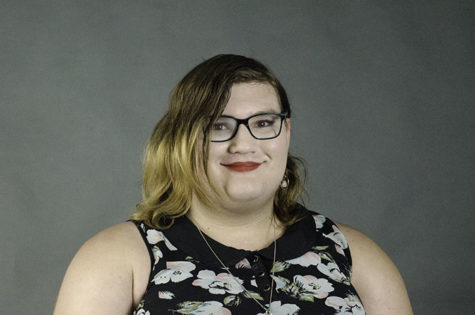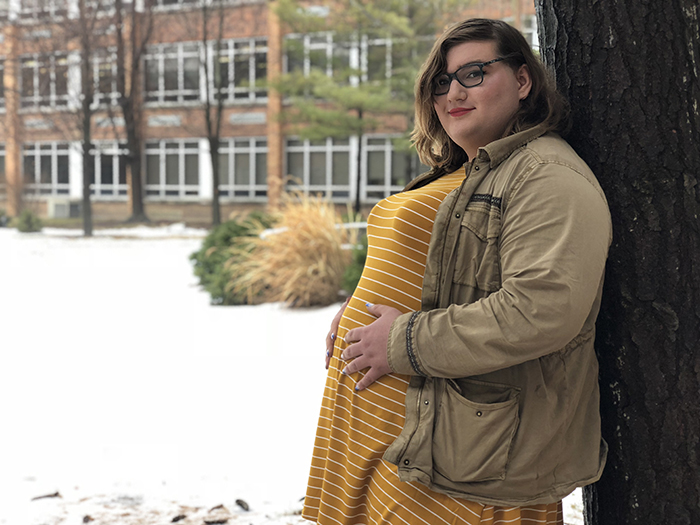A fat chick’s guide to loving your fat chick body
“What if we did a pregnancy photo, except I’m not pregnant, I’m just fat?”
Society punishes fat people, especially women. Skinny chicks can go to any store in the world and they’ll have a smörgåsbord of clothing and styles to choose from. Fat women are essentially relegated to the plus-sized section of a Forever 21—completely empty besides two pairs of camo leggings, one of which is actually a medium that got shelved wrong, and a napkin-thin tee that has a slogan like “Tacos not boys.”
It can be difficult to navigate the world as a fat person, and that is what I call myself. Fat. It’s not a bad word.
A few months ago, I was talking to my school social worker, describing how I was doing mentally. I had been empowered to deal with my depression, and my feelings about my body were a huge part of that positive shift; however, when I used the word “fat” to describe myself, she got this look of deep concern and stopped me.
Despite the upward trend and astounding progress, she saw “fat” to be this inherently negative word. But it isn’t, nor should it be.
For a large portion of my life, I felt all sorts of bad about my body. I felt shame about every squishy inch of skin and shame for my broad shoulders that would “out” me to a blind man.
People and their bodies are not separate entities, so I could never criticize just my belly, love handles or thighs without criticizing who I was entirely, despite my best efforts. Wanting to be thin was never just as simple as wanting a different body: it was about wanting a different life—any life where I wouldn’t be a fatty.
My journey with my body is long and complicated and was not at all simplified by being transgender. But even when I did feel secure in my gender and ability to cope with my depression, there was this ever-present dissatisfaction with myself.
For a few months in early 2017, I wore extremely tight shapewear daily, which caused bruising and cuts on my torso. But it was worth it to me—I would do nearly anything just to think that I looked thinner, because the alternative—the thought that I was fat—was terrifying. It meant that I wasn’t good enough, and I would never be a “real woman.”
Below the corsets, underneath the fat, somewhere in my rather large gut, I knew that they didn’t make me look any different than I had before. My appearance and presentation became this singular, encompassing thought that impaired basic function.
I felt this paranoia, this feeling that at any point, every eye was focused on me, taking note of every imperfection, solely for the sake of record keeping.
This is something everyone needs to remember from time to time, but I want larger people to take special note: no one thinks negatively about you as much as you think about them thinking about you.
And I get it. Even armed with that knowledge, it can be tough to find practical. For me, the way to bridge that mental gap was simple: endlessly repeating what I unemotionally understood to be true—that I was worthy of love.
It was almost mantra-like and necessary to repeat, no matter how little I believed it.
My body is fueled by Diet Dr Pepper and spite, but it was the latter that helped me believe that I was pretty. Every time I compared myself to another woman, I had to consciously choose to deny those negative thoughts and replace them with my ever-evolving mantra. I had to be my own “mom friend” and tell myself how lovely I was.
And it was tough work. There were a lot of things that contributed to where I’m at now, but I had some experiences at an LGBT summer camp that totally shifted my understanding of what loving my physical form looked like.
I was somewhat surprised of how body-inclusive the camp was. It was the first space that I felt was actually radical and equal with its policies in relation to bodies. And that made a difference to me and a lot of people.
In the pool, anyone was allowed to be topless, regardless of what was or wasn’t on their chest, provided they covered their nipples with pasties. For the first few days, the only people who actually did that were either trans men who had top surgery or cisgender dudes. The offer was still out there for everyone.
But a few days in, as I was sitting, feet in the cool water, chatting with other campers, a friend of mine—a trans man with very large breasts—came out of the shower house, pasties over nipples, but otherwise bare-chested.
Not to be dramatic, but I’m pretty sure that was the bravest thing I’ve ever seen. Being able to say, “This is my body, and I love it exactly as it is,” is astounding.
At this point in the year, I had come to a “cease-fire” of sorts with my body; I wouldn’t think about being a fatty, and my body would try to avoid reminding me that I was. It wasn’t all that stable, but it worked better than breaking down every time I saw someone I thought was prettier than me.
Seeing my friend jump into the pool, unwilling to bend to shame, made me think. And I decided to try something I had put off because “fat girls can’t wear them:” I wore a crop top.
It may seem inconsequential, but for me, showing any amount of skin was a massive feat, because when I say I’m fat, I mean it. Looking at my stomach without being disgusted or even displeased was a revolution in my mind.
Showing that skin was the first step to healing and genuine acceptance. I had never thought about it before, but that was the first time that I could look at myself and see “me,” even though physically, I was exactly the same.
It’s been about half a year since, and I’m still feeling good. This is me. This is my body, and I genuinely do not care who thinks it’s repulsive.
I love every stretch mark and roll. My value is not predicated on others’ measurements of me.
There are still some days where I don’t find the same amount of success that I had at camp. I still sometimes see my tree-trunk thighs or my Jell-O arms and have trouble telling myself the truth about them—that I love them. But I revert to my mantra, to beating the love into myself.
I want everyone who is on a similar journey to remind themselves that it’s not so simple as “choosing to love yourself” as your local “yoga mom” might have you believe. We grew up learning to hate our bodies, so healing is a constant and tiring process of looking critically at how we feel about our cellulite and rolls, our skin and our hair or whatever piece of you is not exactly perfect.
You exist for yourself.



Maria Lopez Larucci • Apr 19, 2018 at 11:34 am
Your article has a saddening yet wholesome truth about it an when I was reading your article, I often found myself near tears. Whether it was hearing about your own journey or the LGBT camp you went to, I just found myself saying, “She’s so brave. She is SO brave.” And you are. You one hundred percent are. I find it hard to mention to people that I have PTSD and admitting such a thing for me is what wearing a crop-top is for you. What you wrote in this article is an act of both bravery and self-love and all I can say to you is, you are beautiful. I wish you all the best this world has to offer.
Elizabeth Szpytek • Apr 19, 2018 at 1:05 pm
Hey, thank you for taking time to share your experience. I’m happy that others can relate to my experiences, but at the same time, it makes me very sad that this is something similar to what you’ve experienced. I hope things go well!
Spencer • Feb 2, 2018 at 1:00 pm
This is such a well-written article, and it mangaged to articulate a number of sentiments I’ve felt but have never been able to put into words. I loved the way you explained the difference between generic “love yourself!” positivity and honestly breaking down internalized arbitrary beauty standards. Thanks so much for sharing.
Magda • Jan 31, 2018 at 11:31 am
This was a really beautiful piece, thank you for sharing! <3
Grace • Jan 26, 2018 at 5:43 pm
This is a wonderful message and so well-said. Thank you for being such an honest writer and thinker.
'Rie Lavigne • Jan 26, 2018 at 4:04 pm
Love transforms. Awesome courage to become your best you. Great article, Liz. Stay vibrant and proud.
Dave Schneider • Jan 26, 2018 at 9:48 am
A wonderful story Liz. Thank you for sharing your story with us. You are beautiful and bright light in a world that needs it.